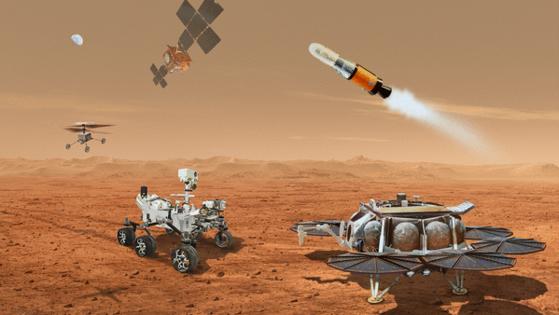NASA's attempt to bring home part of Mars is unprecedented. The mission's problems are not
Published in Science & Technology News
Massive cost overruns. Key deadlines slipping out of reach. Problems of unprecedented complexity, and a generation's worth of scientific progress contingent upon solving them.
That's the current state of Mars Sample Return, the ambitious yet imperiled NASA mission whose rapidly ballooning budget has cost jobs at NASA's Jet Propulsion Laboratory in La Cañada Flintridge and drawn threats of cancellation from lawmakers.
But not all that long ago, those same dire circumstances described the James Webb Space Telescope, the pioneering infrared scope that launched on Christmas Day 2021.
The biggest space telescope ever has so far proved to be a scientific and public relations victory for NASA. The telescope's performance has surpassed all expectations, senior project scientist Jane Rigby said at a meeting recently.
Its first images were so hotly anticipated that the White House scooped NASA's announcement, releasing a dazzling view of thousands of galaxies the day before the space agency shared the first batch of pictures. Thousands of researchers have since applied for observation time.
"The world has been rooting for this telescope to succeed," Rigby told the National Academies' committee on astronomy and astrophysics.
Yet in the years before launch, the success and acclaim Webb now enjoys was far from guaranteed.
The telescope cost twice as much as initially anticipated and launched seven years behind its original schedule. Some members of Congress at one point tried to pull funding from the project. Even the journal Nature referred to it at the time as the "telescope that ate astronomy."
After a thorough assessment of the project's needs and flaws, NASA was able to turn the troubled venture around. Supporters of Mars Sample Return are hopeful that mission will follow a similar trajectory.
"A lot of great science will come out of" Mars Sample Return, said Garth Illingworth, an astronomer emeritus at UC Santa Cruz and former deputy director of the project that is now the James Webb Space Telescope. "But they've got to get real as to how to manage this."
...continued
©2024 Los Angeles Times. Visit at latimes.com. Distributed by Tribune Content Agency, LLC.







Comments